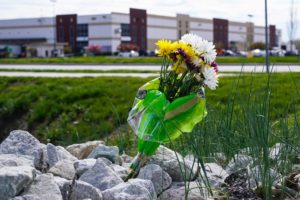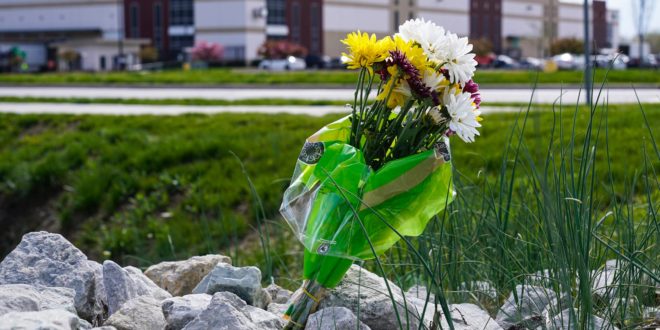Podcast: Play in new window | Download (Duration: 13:43 — 18.9MB)
Subscribe: RSS
Last Thursday, a lone gunman killed 8 people and injured several others in a mass shooting at a FedEx facility in Indianapolis.

Over the past year, leading up to this tragedy, multiple concerns were raised regarding the shooter’s mental health. These concerns were so significant that at one point in March of 2020, the Indianapolis Metropolitan Police Department seized a shotgun from the shooter’s possession. Despite this, nearly a year later, a loophole in Indiana’s Jake Laird Law, also known as the Red Flag Law, allowed the guns used in the FedEx shooting to come into the shooter’s possession.
To further understand the Jake Laird Law and how this loophole was exploited, WFHB met virtually with Indiana University Professor and former Mayor of Fort Wayne, Indiana, Paul Helmke. Paul has used his expertise in gun legislation and public policy in positions as the former president and CEO of the Brady Center and the Brady Campaign to Prevent Gun Violence.
When asked about what the Jake Laird Law actually was and how it was supposed to function Helmke said, “Indiana actually is one of the leaders in the country in terms of trying to take weapons away from dangerous people. Back in 2004, there was an incident where an individual killed a family member, killed a police officer shot and wounded four other police officers and then was killed by the police. After the shootout, it was determined that the weapons he used to kill the other police officer had actually been seized by the police earlier and had been returned to him. And when our legislators and law enforcement folks realize that there was no law on the books that would have allowed law, the police to keep those weapons, they passed this Jake Laird Law. Basically, it was a copy of what Connecticut had done six years earlier. And it’s really a gun removal statute more than just a red flag is Indiana law enforcement the power to ask a judge to take away someone’s weapon, actually, they can take it away without a warrant and then get approval from the court, or they can get the approval from the court first. But if an individual who has been identified as dangerous, has a weapon, this gives the police the power to take that weapon away, then they’re supposed to be hearing 14 days later to determine whether that’s permanent or not. So that’s a good law to have on the books.”
However, regardless of this law and the action taken to previously seize his guns, the shooter was still able to obtain these firearms legally. Helmke speculated the degree to which this shooting could have been prevented, saying “It it’s always difficult to say that something could have been prevented. But I think in this situation, something more could have been done to make this harder for this to have happened. Here’s an individual whose mother identified him as dangerous over a year ago. And because she told the police about that, they came in and took a shotgun away from him over a year ago, the FBI got involved over a year ago, the Marion County prosecutor got involved over a year ago. And under Indiana’s law, his fact then was taken and apparently he didn’t ask for it back. But because Indiana’s law only focuses on removing that gun until there’s a court order that says this person is dangerous, he had the right to go out and buy other guns. And so last summer on two separate occasions, he bought dangerous weapons and then he used them last week, if we had to had a law on the books, that the motive said that dangerous person that is identified as dangerous at the police fill is dangerous that the family fill is dangerous that that person should be put on the prohibited purchaser list. And then if the person contest that they have a chance to get off the list, that procedure might have kept him from getting a gun. But because Indiana basically assumes that anybody should be allowed to buy any gun pretty much anytime and take it anywhere. Unless there’s been a clear finding that they’re dangerous by a court. We end up with these tragedies.”
On Monday, WFHB talked to Bloomington Mayor John Hamilton who expressed the difficulty to create progress in gun legislation at his level of authority. Speaking from his own experience as Mayor of Fort Wayne, Helmke said he sympathizes with mayors who do not have the ability to regulate gun policies in their cities. Helmke went on to say that, “one of the things that happened when [he] was mayor was the Indiana legislature decided to tell cities and towns they couldn’t do anything about gun violence in their communities, couldn’t pass any local ordinance… the state legislature, in their wisdom, decided that they knew more about local communities and preempted all cities and towns in the state from doing anything on their own against gun violence… so one of the things we ought to do is allow local elected officials, give them the power to try to deal with gun violence… so the Indiana Legislature is the group that has decided that they and they alone can decide what kind of regulation we can have on guns… we really don’t have many laws on the national level or at the state level to make it harder for dangerous people to get dangerous weapons.”
However, the burden of this oversight will not be felt by the legislature, but instead falls heavily upon the Indianapolis community. The shooting, which occurred at a FedEx facility whose staff of 4,000 is made up of 90% Sikh-Americans, has significantly impacted the Sikh community in Indianapolis and around the country.
WFHB spoke with Ravleen Ahuja, president of the Sikh Student Association at Indiana University-Bloomington to hear her perspective on the tragic event.
Ravleen described her position within the organization and the work the Sikh Student Association does at Indiana University. Ravleen explained that she was one of the founding members of the organization two years ago and that the group was founded to create a comfortable space for Sikh students on campus.
Ravleen expressed the distress felt both personally and with the Sikh community as a whole, saying that “on campus [the shooting] was devastating, especially that it happened so close to [Bloomington]… when something like this happens it’s such a blunt hit to the community and hit to the heart personally, and although we are the fifth largest religion in the world it is still a small community”.
This specific shooting has been an especially troubling event for the Sikh community as the shooter’s past employment at the same FedEx facility, and his history visiting white supremacist site online raises questions of his motive. Having been a past employee at that FedEx facility, it is more than likely that the shooter was aware that the employment staff of about 4,000 was 90% Sikh-American. Speaking to this point, Ravleen said that “when attacks like this happen on our community we often have to spend time educating everyone on who we are, and it takes away from the tragic events that happen because we constantly have to say who we are and what we stand for… but we hope that people who are not a part of our faith can take time to learn about us so things like this don’t happen again.”
With the investigation still underway, the Sikh community is left to mourn this tragic loss. Ravleen shared some information about upcoming memorial services for all of the victims, saying that “in the Bloomington at least, the Sikh Student Association, this Sunday at 7pm at the Sample Gates, is having a candlelight vigil. Candles will be provides, masks are required but we encourage all to come. We are going to commemorate the victims and think this is a nice way to remember them.”
It may be too soon to say if the tragedy at the FedEx facility will serve as a turning point in Indiana state gun legislation, or if it will be just another addition to the growing list of mass shootings in the United States. Paul Helmke says he is hopeful for Indiana’s future – that this tragedy may espouse change in the state’s gun policies, going to say, “I would hope this FedEx shooting would be a wakeup call for our legislators and the people of the state to realize how weak our gun laws are. Nobody is trying to take everyone’s guns away, but we should all agree that we don’t want people with dangerous tendencies to legally be able to get a gun; this puts us all at risk”. Helmke suggests contacting state legislators and encouraging local officials to lobby for increase gun safety.
WFHB would like to take a moment and honor the names of the victims of this tragic event as read by President of the Sikh Student Association Ravleen Kaur Ahuja. Ravleen read, “Amarjit Sekhon who was 48; Jasvinder Kaur who was 50; Amarjeet Johal who was 66; Jaswinder Singh who was 68; Samaria Blackwell who was 19; Karli Smith, also 19; Matthew R. Alexander who was 32; and John Weisert who was 74”. From WFHB community radio we extend our deepest condolences to the families of all of the victims.
 WFHB Bloomington Community Radio
WFHB Bloomington Community Radio


